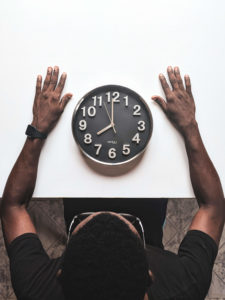Circadian rhythms are cycles that make up your body’s internal clock over the course of a 24-hour day. These include physical, mental, and behavioral changes within a typical day. This natural cycle responds first and foremost to light and dark. It affects most living things, including plants, animals and even microbes. The word “circadian” finds its roots in the Latin phrase “circa diem,” which means “around a day.”
The sleep-wake cycle is one of the most important circadian rhythms. It helps control your daily schedule from sleeping to being awake to sleeping again.
How do Circadian Rhythms Work?
Circadian rhythms are influenced by sunlight and darkness, as well as other factors. Your brain receives signals which tell your body when to activate the release of certain hormones, alter your body temperature, regulate your metabolism and when to keep you alert or prepare you for sleep.
Circadian rhythms are synchronized with the brain’s “master clock” and affect different systems of the body. Environmental cues, especially light, directly influence the master clock, which is the reason that circadian rhythms are tied to the cycle of day and night. Although other cues, like exercise, social activity, and temperature can affect the master clock, light is the most powerful influence on all of your circadian rhythms.
Circadian Rhythm’s Effect on Overall Health

Hormonal and body temperature cycles all rely on the synchronization of our circadian rhythms.
Your circadian rhythm may be disrupted by external factors or health issues. Maintaining healthy habits and a regular daily routine can help you respond better to this natural rhythm of your body.
Maintaining all of your circadian rhythms is vital to your health. If you experience any disruption, you could suffer from long-term severe health conditions within your cardiovascular system or gastrointestinal system and may become susceptible to obesity, diabetes and mental health disorders.
Circadian rhythms also influence your mental health, including your susceptibility to psychiatric illnesses such as depression and bipolar disorder or dementia.
Circadian Rhythms and Sleep Issues
When properly aligned, a circadian rhythm promotes regular, restorative sleep. But when it’s off balance, you can experience significant sleeping problems, including insomnia.
Hormones like Melatonin and Cortisol are also dependent on your internal clock. Melatonin is released at night to help make you tired, while your body releases more Cortisol in the morning to make you alert throughout the day. When this clock is thrown off, it means that your body does not function properly.
An out-of-whack circadian rhythm can negatively affect sleep in a number of ways, which increases your risk of insomnia and excessive daytime sleepiness. Because sleep plays an essential role in our productivity and overall health, there are often significant consequences to having a circadian rhythm that is off balance.
If your circadian rhythm is off, your internal clock won’t signal when it’s time to sleep and can prevent sleeping through the night. This reduces a person’s total sleep and can also mean shallower, fragmented, and lower-quality sleep.
Circadian rhythm disruptions are potential contributors to obstructive sleep apnea, a sleep disorder marked by repeated lapses in breathing. Obstructive sleep apnea reduces the body’s oxygen levels and causes numerous sleep interruptions through the night.
Disruptions to Circadian Rhythm
Disruptions to the circadian rhythm can be short-term or long-term.
Common disorders include:
Jet Lag Disorder, which is when you cross multiple time zones in a short period of time. Until you are able to acclimate to the day-night cycle of your new location, you will experience problems such as fatigue and the inability go to sleep and stay asleep at your desired time.
Shift Work Disorder occurs when work is the reason for major disruptions in your circadian rhythm. A shift that requires working through the night and sleeping during the day puts your sleep schedule directly at odds with the daylight hours.
With Advanced Sleep Phase Disorder, you may find yourself getting tired early in the evening and waking up very early in the morning. Even if you want to shift your sleep schedule to stay up later and get up later, if you have Advanced Sleep Phase Disorder, you won’t be able to do so. This rare disorder affects about 1% of people in middle and older age. It’s most frequent in older adults.
With Delayed Sleep Phase Disorder, you may stay up late at night and sleep in late in the morning. It is rare among the general population only affecting 1 or 2 people out of every 1,000 but impacts up to 16% of teens. The exact cause is unknown.
Non-24-Hour Sleep Wake Disorder occurs in those who are not able to receive the necessary light-based cues that move their circadian rhythm. This is a common problem for the blind. Those with this disorder find that their bodies are constantly shifting their sleeping hours backward by just minutes or even hours at a time.
Irregular Sleep-Wake Rhythm Disorder is a rare disorder in which you have no consistent pattern to your sleep cycle and may take many naps or have short sleeping periods throughout the day. It is often connected to conditions that affect the brain, such as dementia or traumatic brain injury, which limit the proper functioning of the master clock in the hypothalamus.
Improve Your Circadian Rhythm

Follow a consistent sleep schedule so your body will not have to adjust to an unstable circadian rhythm. This will have a positive effect on your overall health.
Exercising during the day will make it easier to fall asleep at night.
Avoid stimulants like caffeine in order to help maintain the natural balance between sleep and wakefulness. If you are having trouble sleeping, avoid caffeine altogether after lunchtime.
Limit artificial light exposure at night so it does not interfere with your circadian rhythm.
Make it a habit to dim the lights and put down electronic devices a few hours before you go to bed. If this is hard for you, try not to take electronics into the bedroom to avoid temptation.
When you’re getting ready for bed, make sure your bedroom is cool and dark. Keeping blinds or curtains closed throughout the day is a great way to control the light and temperature of your room. Use a fan or air conditioner, especially in warmer climates or seasons.
Comfort is key when it comes to your sleeping surface. Find a mattress that supports the natural curve of your spine and allows you to sink into in just the right spots. Pick your pillows the same way and make sure your bedding is made with natural, breathable materials.
Control Your Sleep-Wake Cycle With the Right Mattress
Your mattress can directly disrupt your body’s sleep-wake cycle if it does not allow you to get the quality sleep you need. If you notice a sudden change in your sleeping cycle it could be due to your mattress. If you experience hip or joint pain, an achy lower back or suddenly can just not get comfortable at night, it may be time for a new mattress.
Finding a proper mattress for your individual needs is best done by testing your options in person. Stop by our Mattress Express location of your choice and a sleep specialist will help guide you.

